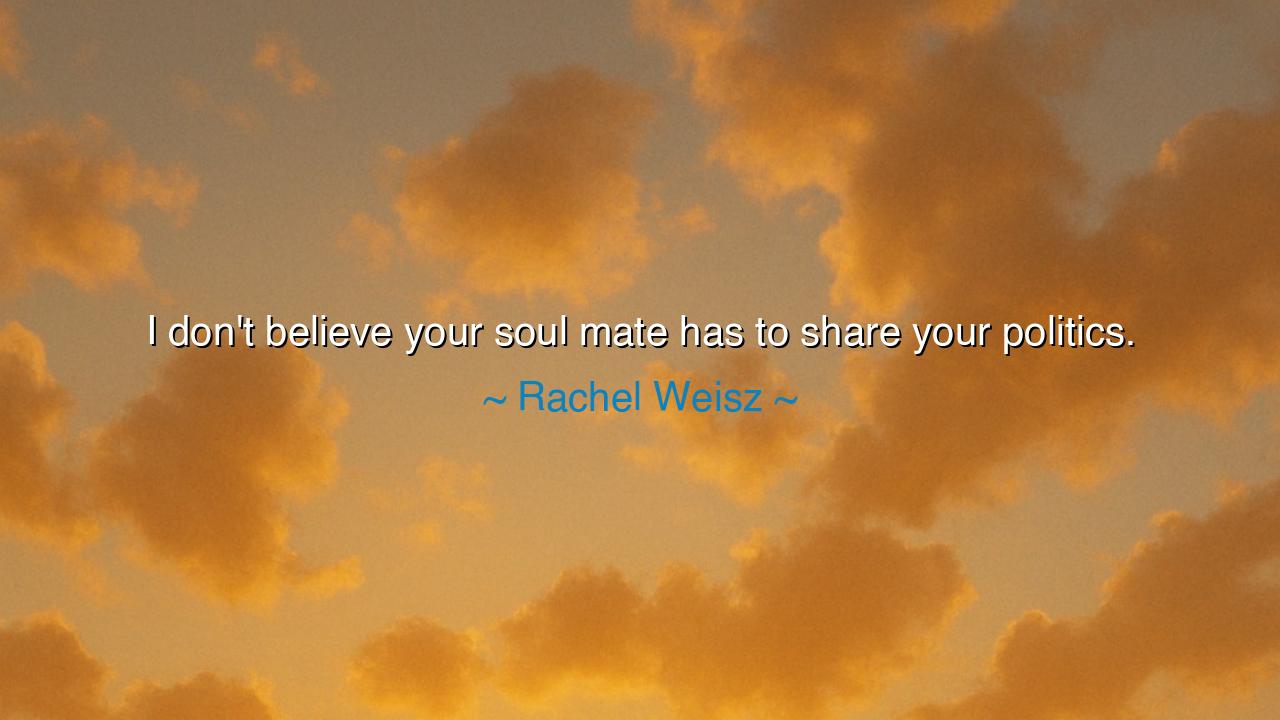
I don't believe your soul mate has to share your politics.






The words of Rachel Weisz, “I don't believe your soul mate has to share your politics,” remind us that the bond of the heart transcends the quarrels of the forum. Politics is the realm of opinion, strategy, and worldly vision, but the soul mate belongs to the realm of love, where spirit calls to spirit. To demand perfect alignment of beliefs in all things is to confuse the union of hearts with the clamor of public life. Love, when true, is vast enough to hold difference without breaking.
The ancients knew this balance. In Greece, philosophers distinguished between eros, the fire of passion, and philia, the steady bond of friendship. The greatest unions combined both, built not on sameness, but on respect, patience, and harmony amid difference. To love another soul is not to mirror one’s own thoughts, but to embrace another’s being, even when their path in politics or custom diverges. Thus, Weisz speaks with timeless wisdom: the soul is not conquered by debate, but bound by affection.
History shows us radiant examples. Consider John and Abigail Adams. Though both served the cause of American independence, they often quarreled about matters of governance, diplomacy, and policy. Yet their marriage endured as one of the strongest partnerships in history, rooted in love, trust, and respect that outlasted their disagreements. Their story proves that a soul mate need not share every political vision, but must share devotion, loyalty, and truth of heart.
Weisz’s words also caution us against shrinking love to ideology. To demand absolute agreement in politics is to reduce the soul to a ballot, when in truth the heart is more mysterious and infinite. A union built only on sameness of opinion is fragile; a union built on patience, laughter, and sacrifice can withstand storms. Love that endures sees beyond votes and policies, into the eternal depths of character and compassion.
Let the generations remember: the world of politics shifts like sand, but the soul endures like stone. To find a soul mate is to discover not a reflection of your views, but a companion of your spirit. Honor difference, for it tests and refines love. And know that the truest bond is not in agreement of mind, but in harmony of heart, where two souls walk together though the world around them may argue and divide.






PTPhong Tran
Rachel Weisz’s comment about soul mates and politics makes me reflect on the importance of compatibility in a relationship. I get the idea that people can be soul mates without agreeing on everything, but what about values that stem from politics, like social justice or human rights? Can you reconcile having a partner who doesn’t share your sense of justice or fairness? Is it possible to separate those issues from love?
MA01. Minh An
I think this is a great perspective, but I wonder if it can hold true in the long term. When you’re in a relationship with someone who has very different political views, how do you avoid clashes during election seasons or when major political events happen? Can love really override those fundamental differences, or will politics always rear its head as a point of contention? Does it make sense to try to find someone with similar views?
TNThao Ngoc
I like the idea that a soul mate doesn’t have to share your politics, but there’s always this nagging question: when political differences become so stark, how do you navigate conversations about important issues? Could it create friction in day-to-day life? How do you balance respecting each other’s views while maintaining your own stance on key issues, especially when those issues have real-world consequences on your lives together?
HMHoa My
This quote makes me think about how much political views shape our lives. While I agree that soul mates don’t have to agree on everything, politics is about much more than voting patterns—it’s about values and priorities. How much compromise is reasonable when you’re in a relationship where one person is deeply passionate about their political beliefs and the other isn’t? Is it possible to find common ground in those situations?
MCThien Minh Cao
I see what Rachel Weisz is saying, but isn’t it hard to completely separate politics from personal values? Politics often reflects deeply held beliefs about justice, fairness, and how we view the world. If your partner’s views conflict with yours on major issues, does it ever affect the way you view each other’s character? Can we really disconnect politics from someone’s personal identity, or are they always intertwined?